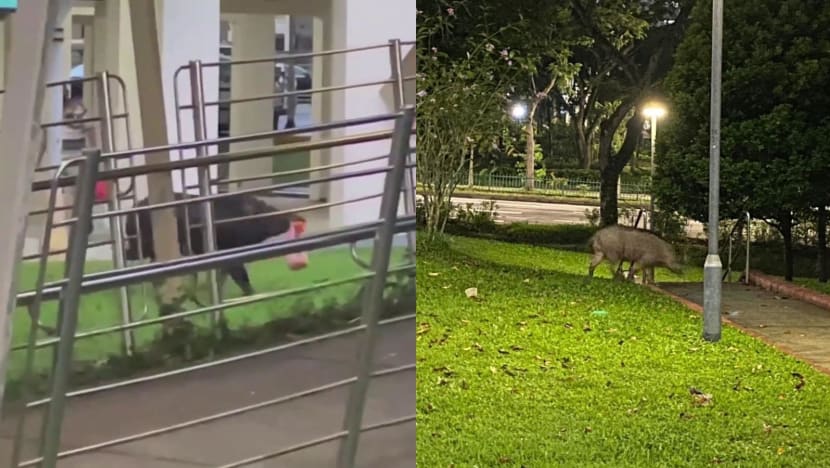
Wild boars seen at Bukit Panjang. (Screengrab/Photo: Ju Mosin, CNA/Javier Lim)
But most residents CNA spoke to say the animals should be left alone.

Wild boars seen at Bukit Panjang. (Screengrab/Photo: Ju Mosin, CNA/Javier Lim)
SINGAPORE: The National Parks Board (NParks) is installing fences to prevent wild boars from straying out of forested areas, as part of ongoing mitigation measures in Bukit Panjang after a woman was attacked in the area.
Bukit Panjang's Member of Parliament (MP) Liang Eng Hwa has also called on the agency to set up more traps to catch the animals, though residents CNA spoke to on Friday (May 5) said the boars should be left alone.
The attack on Ms Durga Devi happened close to midnight on Monday, with The Straits Times reporting that the 34-year-old resident had alighted at a bus stop at Bukit Panjang Road when a wild boar flung her from side to side.
She underwent four operations after suffering multiple wounds and cuts on her right calf, buttock and arm, according to the report.
In response to CNA's queries, NParks' group director of wildlife management Adrian Loo on Saturday said the boar was found lying by the roadside, and assessed by the agency's wildlife vet to have two broken hind legs.
The pig was "thus euthanised humanely", said Dr Loo.
NParks added that it was monitoring the area where the incident happened.
"We are also working with stakeholders on public education and outreach, to promote safe and responsible human-wildlife encounters," said Dr Loo.
"This includes discouraging and taking enforcement action against the illegal feeding of wildlife, which can alter their natural foraging behaviour and lead them to rely on humans for food."
The Animal Concerns Research and Education Society (ACRES) said last year that food waste left outside rubbish bins has been attracting wild boars to Housing Board estates in Bukit Panjang.
It posted a video in February 2022, of a wild boar foraging through rubbish at the void deck of a HDB block.
ACRES said at the time that the public needed to bin their food waste and trash, adding that it would be meeting the Holland-Bukit Timah Town Council to try and resolve the issue.
Mr Liang, the Bukit Panjang MP, on Saturday told CNA that he asked NParks to review its measures to deter wild boars from entering the neighbourhood.
"Among others, NParks needs ... to manage the population as well as (be) quicker in their response whenever residents report sightings of wild boars," he added.
"I have also told NParks to look into adding more fencings at the forested areas and paths where the wild boars usually roam."
Mr Liang said he visited the Ms Durga Devi's family on Wednesday to understand the help they needed, and on Saturday again to follow up and offer more support.
Residents told CNA it was not uncommon to see wild boars near housing blocks in Bukit Panjang, and that they tended to appear in the mornings or at night, usually near Zhenghua Nature Park.
Some expressed concern about their safety, after the May 1 attack.
“Most residents are (concerned), especially now we learned they are very bold in the presence of humans,” said Ju Mosin, a Bukit Panjang resident who filmed a boar near a bus stop on Friday.
“I have personally seen two big boars within the estate … But not far from that is Chestnut Nature trail and that is their habitat.”
A resident who wanted to be known only as Mr Ong said he often encounters wild boars during walks at Zhenghua Park, and that the animals are sometimes seen with their young.
Although his wife was concerned given the latest attack, Mr Ong said he was not too worried as the animals typically “run away” when they hear footsteps.
Agreeing, Muhammad Fitri, a delivery rider, said: “I’ve never seen them (attack people). They run.”
All the residents CNA spoke to said they had not seen any steps taken by authorities to address the issue of food waste left outside bins.
As for what should be done with the boars themselves, many residents conceded that they should be left alone.
“It is their habitat as much as it is ours,” said Mr Ong.
A resident who wanted to be known as Ms Aini added: “Their natural habitat is near this area. We’re constantly redeveloping the roads and disturbing their habitats.”
NParks handled nine cases of wild boar incidents each year in 2020 and 2021, eight cases in 2022, and two cases in 2023 as of Wednesday.
The board adopts a community- and science-based approach to managing wild boar encounters, said Dr Loo.
This includes habitat modification, conducting studies to better understand the animals' ecology and distribution, managing its movements, relocation and culling.
NParks also works with public agencies and developers to "erect hoarding to prevent wildlife such as wild boars from straying into nearby residential areas".
Population control measures are also implemented when needed to protect the public, as wild boars have the ability to reproduce quickly and lack natural predators in Singapore, said Dr Loo.
"Similar to other wild animals, wild boars can be unpredictable in behaviour, and can pose a risk to public safety even if not deliberately provoked," he added.
The advice to the public is to remain as calm as possible and move away from a wild boar if encountering one, keeping a safe distance and refraining from cornering or provoking it.
"If adult wild boars are seen with young piglets, keep a distance and leave them alone as they can become aggressive when trying to defend their young," said Dr Loo. "The public should also refrain from feeding wild boars."